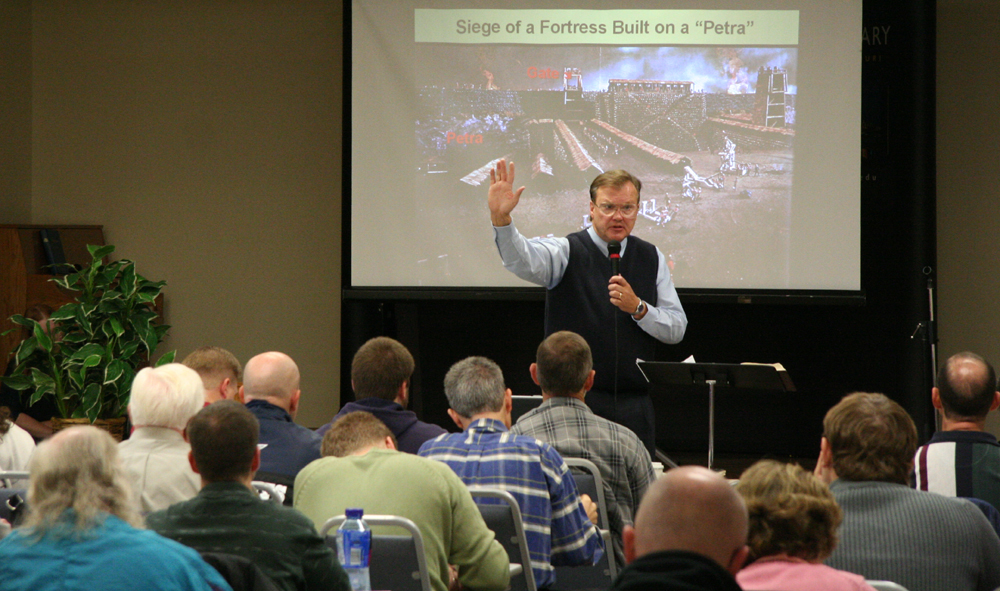
KANSAS CITY, Mo. (BP)–A two-day interfaith evangelism workshop on Roman Catholicism drew more than 85 participants from five states to Midwestern Baptist Theological Seminary’s Kansas City, Mo., campus.
An array of presentations — from the origin of the Roman Catholic Church to the veneration of Mary -– sought to equip participants for witness and ministry to the largest denomination in America, which has an estimated 74 million members on the continent.
Midwestern President R. Philip Roberts, who served as interfaith evangelism director at the North American Mission Board from 1994-99, presented a session titled, “Nashville and Rome: Are We on the Same Path?” to address ecumenical pressures to unite with Roman Catholics.
“While Baptists and traditional Catholics share in common an orthodox view of God and Christ, there are clear differences which divide us,” Roberts said. “The most obvious one is a different view on salvation.”
Midwestern theology professor Mark DeVine emceed the Oct. 21-22 conference and spoke on the differences between Protestants and Catholics, including the question of authority between Scripture or tradition -– and its impact on salvation.
Compared to the doctrine of tradition as ultimate authority in Roman Catholicism, historic Christianity has found its authority solely in the Bible, DeVine said, citing reformer Martin Luther as an example.
“Luther treasured tradition insofar as it coincided with the teaching of Scripture,” DeVine said. “Thus he took great pleasure in quoting St. Augustine against the theology of the late medieval papacy. Yet Luther acknowledged only one source of divine revelation –- Scripture alone, or sola scriptura.”
Only where Scripture stands as judge of all human thought, DeVine said, can idolatry be avoided and confidence in divine truth flourish.
Michael McMullen, MBTS church history professor, gave a detailed examination of the progression of Roman Catholicism from the disciples believing in the crucifixion and resurrection of Christ to the development of Catholic doctrine such as the veneration of Mary and salvation by sacraments.
“Emperor Constantine has always borne much of the blame, and probably rightly, for the church becoming much more superficial in its beliefs and practices,” McMullen said. “But believers, too, also share in that blame, for whenever the people of God allow themselves to drift from Scripture’s clear teachings then we are deliberately thereby placing ourselves in great danger.”
Roman Catholicism is an example of “just what can happen when the doctrines of men become as or more important than the words of Scripture,” McMullen said.
Bill Gordon, apologetics evangelism associate with the North American Mission Board, noted that many of the customs of the Catholic Church changed as a result of Vatican II, but the council did not modify any of Catholicism’s major doctrines.
“The meaning and significance of the seven sacraments remained unaltered,” said Gordon, a specialist in Roman Catholicism. “Likewise, Vatican II did not alter the practice of offering prayers to Mary and the saints.”
The Catholicism workshop was “one of the largest attended we’ve had so far,” Roberts said, referring to previous workshops held on Islam, Mormonism and the New Age.
“We offered this seminar to equip and assist the evangelical church, and particularly Southern Baptists, with the necessary knowledge and differences of Roman Catholicism so they can effectively minister to their friends, neighbors and co-workers,” Roberts said.
–30–
Three audio sessions of the MBTS Roman Catholic Workshop are available for download at: www.mbts.edu/Resources. Audio CD recordings of the workshop also are available for $4 each plus $1.50 shipping and handling by contacting the MBTS library at 1-800-944-6287.

















